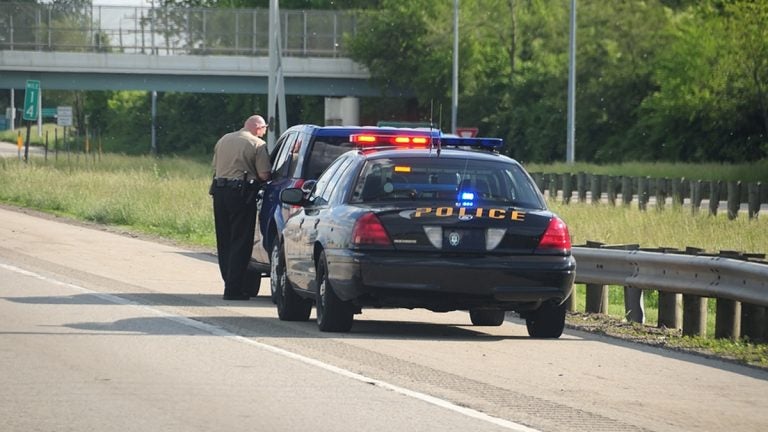Essay: Someone was watching over me on my first traffic stop for driving while black
There has been renewed attention to racial profiling and the epidemic of police brutality. This personal account of racial profiling has become one of many for me.

(AnnieAnnie/Big Stock Photo)
The past several years have brought renewed attention to racial profiling and the epidemic of police brutality. This personal account of racial profiling has become one of many for me.
The past several years have brought renewed attention to racial profiling, and the epidemic of police brutality. To that end, scores of prominent African American men have come forward to share their personal experiences with racial profiling, including President Obama, Eric Holder, Questlove, Chris Rock, and Tyler Perry. What follows is my personal account of racial profiling, which I experienced on or about Dec. 22, 2002. It has become one of many for me, and seemed appropriate to share during the course of these debates.
—
“Yes, I am going to yell at you!”
The officer’s words shot from his lips, pierced the brisk night air, and struck me like a slap to the cheek. I turned the other to better look him in the eyes.
My brain scurried to unearth answers to the persistent questions “Why? Why am I outside in the cold while this officer berates me? Why did he pull me over in the first place? Why is he still yelling — but, more importantly, why is there nothing I can do about it?”
Failing to produce a viable explanation, I sought solace elsewhere, for as Toni Morrison once wrote, “Since why is difficult to handle, one must take refuge in how.”
Early on the morning of Dec. 22, 2002, my car cruised down Connelly Street in Southwestern Atlanta, caressing each curve of the long, narrow, winding road. Laughter rang throughout the car as three friends and I recalled the events of the previous day. Unbeknownst to us all, a police car pulled directly behind me and followed us for roughly a mile and a half. (I know because the officer later told me how long he followed me.) As the bright-red glare of his lights burst through the air, our laughter dissipated and shock overtook our faces.
I obediently pulled my car over, as the lights beckoned me to do, and parked in a nearby parking lot. As the officer approached the car, I assured my friends all was well, and that the matter would resolve itself quickly, having no inclination of what lay ahead.
“What seems to be the problem officer?” I asked.
“I’ll tell you as soon as you get out of the car!” he bellowed.
Stunned, I asked, “Why do I need to get out of my car?”
“I’ll tell you as soon as you get out of the car!” he screamed in response.
“Hold on, let me get my license and registr—,” I began, but before I could complete my sentence he erupted, more agitated than before.
“Never tell an officer of the law to ‘hold on,’ when he gives you an order! One more time and I’ll have you arrested for obstruction of justice!” he roared.
“I’ll be back,” I told my friends, not overly confident of my assertion.
I climbed out of the car, adhering to the officer’s command, and followed him over to his squad car. My mind juggled thousands of thoughts in an effort to make sense of the situation, but to no avail. I was a bit frazzled, but anger seemed to predominate any discernible emotions.
“What is the problem officer?” I asked again, this time with a clear sense of frustration.
“Do you know how fast you were going?” he asked sternly.
“Forty-five,” I replied, irritated by his implication that I was driving any faster. Clearly, my response was not what he was looking for, because he erupted again, even more livid than before.
“You were not going 45! Do you know how fast you were going?” he shouted repeating his previous question.
“Forty-five,” I replied.
“You were not going 45,” he shouted. “Forty-five is the speed limit! Do you think I would pull you over for no reason? I would not pull you over for no reason!”
Though his outbursts were rhetorical in nature, I almost felt the need to respond and notify him that, in fact, he did pull me over for no reason. I restrained myself, however, knowing this was neither the time nor the place for such commentary.
“Have you ever been shot before?” he asked.
“No,” I replied bluntly.
“Have you ever been stabbed with a straight-edged blade,” he asked while gesturing at my abdomen.
“No,” I said. “I can’t say that I have.”
“I haven’t either, and I don’t want to experience that! Every time I pull someone over, I run that risk, so I would not pull you over for no reason!”
He roared sentence after sentence of his superfluous soliloquy, elevating his tone repeatedly, as though the increased volume better conveyed its significance. Instead, his raised voice and incensed yelling only allowed for the periodic spraying of my face with his saliva.
For a brief moment, his words were indistinguishable, muddled sounds. I clenched the muscles in my jaw, and the hairs on the back of my neck stood on end as my anger kindled.
“Officer, officer,” I said, beckoning for his attention. “You do not have to yell at me. I am not hard of hearing.”
And this was when he bellowed: “Yes, I am going to yell at you!”
He continued his rant: “When you speed, you put innocent lives in danger. You could kill or maim some child. And it’s my job to protect them.”
He then administered a sobriety test, yelling when deeming it necessary. When the test concluded, and unequivocally determined that I was sober (I had already advised him I had not consumed any alcohol), he asked me where I kept my vehicle registration.
I replied, “In my car,” and pointed in that direction. His eyes crawled down my extended index finger, following it to my car. For a moment, he paused, as if some startling revelation troubled him. I chuckled as I became aware of what caught his attention: His eyes were fixated on the “Got Jesus?” emblem on my license plate. The glare from his headlights made it perfectly visible, even from our considerable distance.
Disoriented, the officer vacillated between shock and befuddlement. When he regained his composure, he explained that I was driving faster than he cared for — though he never indicated a specific speed. Then he told me, “In the future, you should pay closer attention to the speed limit. I don’t mind you going five miles over the speed limit, but after that, you are driving too fast.”
He then walked me over to my car and notified me he would excuse my “excessive” speed that morning “and let [me] go this time.” Waving to each of my three friends and then to me, he wished us a “Merry Christmas,” and sent us on our way.
I suppose on that night, I had yet another reason to thank God for Jesus.
—
Timothy Welbeck is an attorney, lecturer of African-American Studies, hip-hop artist, and writer. His scholarly work examines hip-hop as an African folk art birthed America, in addition to hip-hop as a microcosm of the African-American experience. Timothy’s work as an attorney and scholar has allowed him to contribute to various media outlets, such as the BBC Radio 4, NPR, the Huffington Post, and the Philadelphia Inquirer.
WHYY is your source for fact-based, in-depth journalism and information. As a nonprofit organization, we rely on financial support from readers like you. Please give today.




